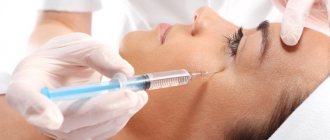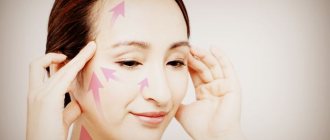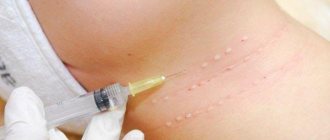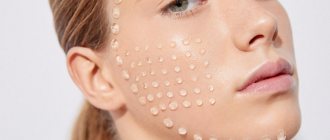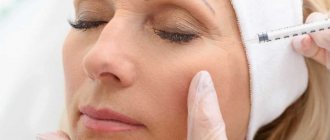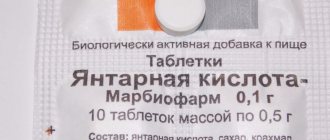Biorevitalization: mechanism of action of beauty injections
A few words about how beauty injections work and how the desired effect is achieved.
Renewal of the intercellular substance of the dermis and its cellular composition is a continuous process. In fact, the skin is constantly renewed through a self-healing process called physiological regeneration. In youth, the rate of physiological regeneration is high, due to which the skin maintains its tone and elastic properties. With age, the regenerative potential of tissues weakens. The proliferative and synthetic activity of cells decreases, and the degradation of collagen and hyaluronic acid molecules, which form the basis of the intercellular substance, begins. As a result of these changes, the skin loses its tone and becomes less elastic. External manifestations of aging are static wrinkles, deep folds, increased microrelief, and changes in skin color.
The goal of the biorevitalization course is to enhance the regenerative potential of integumentary tissues. The purpose of beauty injections is to stimulate the division, differentiation and synthetic function of fibroblasts - cells responsible for the synthesis of key components of the intercellular substance. Biorevitalizants promote renewal of the collagen framework, increase the concentration of hyaluronic acid in the dermis, improve skin hydration, and restore lost elasticity to it.
The desired changes are achieved by enhancing physiological tissue regeneration; in the context of biorevitalization and alcohol, it is important to focus on this. Most biorevitalizants include hyaluronic acid in combination with various organic compounds (vitamins, growth factors, trace elements, amino acids, homeopathic substances) that have a stimulating effect on regenerative mechanisms.
In other words, the goal of a course of anti-aging procedures is to renew and self-heal the dermis by activating internal reserves. Yes, under the influence of the introduced hyaluronic acid, tissue hydration improves, but its stimulating properties are much more important. The task of a cosmetologist is to stimulate restoration reactions, change the direction of the resulting vector of metabolism from gradual degradation to synthesis, renewal, rejuvenation!
How to prepare for biorevitalization
There are several important rules for preparing for biorevitalization; a good specialist will definitely tell you about them:
3 days before injections, you should not take aspirin or other blood thinning medications. If you neglect this rule, during injections there is a higher risk of bruising and bleeding, and the skin will take longer to heal.
For the same reason, it is advisable to exclude alcohol, energy drinks and tonic drugs on the eve of the procedure. Such as ginseng and ginkgo biloba.
Plan the procedure for a weekend or vacation, as it will take you 2 to 5 days to restore your appearance. In addition, alcohol is not advisable after the procedure, so do not do biorevitalization on the eve of possible celebrations.
Physiological regeneration and alcohol
Now about how the concepts of physiological regeneration and ethanol are combined, is it possible to drink alcohol after biorevitalization? There is an expression in the fitness community that “sport and alcohol do not mix.” This is explained by the fact that improvement in body composition is a consequence of the systematic activation of physiological regeneration by stimuli generated during training. Alcohol blocks self-healing and negates the efforts made.
Likewise, alcohol weakens and even neutralizes the effect of anti-aging procedures. Self-healing processes under the influence of ethanol slow down so much that even the most powerful biorevitalizants either will not have an effect, or it will not be sufficiently pronounced. The following explains in more detail why this happens.
1. Ethanol and enzymes . All synthetic processes, and indeed all biochemical reactions in the human body, occur with the participation of enzymes, or enzyme systems. The activity of enzymes determines the condition of muscle tissue, dermis, and the functioning of internal organs. The processes of physiological regeneration are entirely dependent on enzyme activity. If the enzymes are inactive, recovery becomes impossible.
Ethanol blocks enzyme systems, which deals a crushing blow to the regenerative abilities of tissues. The degree of blocking depends on the dose, but even minimal amounts can slow down regeneration and neutralize the effect of the rejuvenating procedure. As a result, synthetic processes in the dermis, which should lead to strengthening and rejuvenation of the intercellular substance, not only do not accelerate, but even slow down. The resulting vector of metabolism still remains directed towards degradation caused by the aging process.
2. Alcohol and toxins . One of the conditions for complete tissue regeneration is the timely removal of toxic substances formed during metabolic processes. Normally, the body quickly eliminates toxins, but drinking alcohol slows down the removal of metabolic byproducts. The accumulation of toxic products of biochemical reactions in the skin negatively affects the rate and quality of restoration processes. In addition, ethanol itself is a poison; this should also not be forgotten.
3. Ethanol and growth factors . Beauty injections help enrich the dermis with nutrients and catalysts for regenerative processes, including growth factors, amino acids, and vitamins. Under the influence of alcohol, the destruction of biologically active substances accelerates and their stimulating activity decreases.
4. Alcohol and blood vessels . Another aspect of the influence of alcohol on the human body is associated with changes in the vascular bed and peripheral circulation. It is a well-known fact that drinking alcohol leads to a short-term dilation of blood vessels in the skin, which is accompanied by a feeling of warmth. The effect is short-term, followed by a reverse reaction in the form of vascular spasm with worsening blood circulation.
Vasospasm with slower peripheral circulation leads to the fact that cells do not receive enough oxygen. The generation of energy for restoration processes deteriorates. Tissue trophism is disrupted, the delivery of nutrients and building materials necessary for the synthesis of key macromolecules (collagen, hyaluronic acid) of the intercellular substance of the dermis is slowed down. It has already been said about slowing down the elimination of toxins.
How long after biorevitalization can you drink alcohol, its effect on the skin
To know how long after biorevitalization you can drink alcohol, you should consider the following indicators:
- quality of alcoholic beverage;
- frequency, volume of use.
According to experts, two glasses of, for example, good quality red wine are unlikely to spoil your beauty and create health problems. And in this case, the answer to whether alcohol can be drunk after biorevitalization will be cautious or neutral. To answer categorically the question of whether wine is possible after biorevitalization, you should consult your cosmetologist.
With regular alcohol consumption, the body quickly signals dehydration. Dry skin leads to loss of smoothness, dullness and fine wrinkles will become more expressive. Is it possible to drink after biorevitalization? The decision on this issue remains only with the client.
You should know that alcohol destroys the presence of vitamins C and E in the body, which preserve protein and are responsible for the elasticity of the skin. In a person who drinks regularly, the oval of the face changes and the skin sag. Therefore, the question of whether it is possible to drink alcohol after biorevitalization should not worry patients for a certain time, since cosmetology is difficult to cope with changes and significantly worsens the effect.
How to enhance the rejuvenating effect?
So, there are at least four reasons for the incompatibility of biorevitalization and alcohol. If you want to get the maximum possible effect from the course, give up alcohol for the entire rejuvenation period. To enhance the effectiveness of the procedures, it is also advisable to quit smoking. Nicotine is another toxin that blocks enzyme systems, provokes vasospasm, and impairs tissue trophism and oxygenation. If you cannot completely give up the bad habit, try to reduce the number of cigarettes you smoke.
To enhance the anti-aging effect, you should follow a healthy, balanced diet. Do not try to combine weight loss diets with a course of biorevitalization; A diet with a calorie deficit will make a complete renewal of facial skin impossible. The menu should contain a lot of plant foods rich in microelements and vitamins.
It is very important to provide the body with sufficient amounts of omega-3 fats and other PUFAs. They are part of cell membranes, have anti-inflammatory activity, and perform regulatory functions. The optimal source of omega-3 is fatty fish or fish oil. The currently popular flaxseed oil, unfortunately, does not provide the body with a sufficient amount of essential fats (eicosapentaenoic acid, docosahexaenoic acid).
Throughout the entire rejuvenating course, it is important to follow the recommendations of the cosmetologist who performs the procedures. You can always get more detailed information about biorevitalization and the factors influencing its effectiveness at a personal consultation with a cosmetologist at the Soho Clinic.
Contraindications to biorevitalization
The list of contraindications to biorevitalization is quite standard, including:
- oncology, autoimmune diseases, acute infections and herpes;
- dermatological diseases;
- pregnancy and breastfeeding.
In addition, an allergy to the components of the drugs can be a serious obstacle to injection rejuvenation. If you are allergic, during your initial consultation with a cosmetologist, find out the composition of the drugs he works with and choose the one that suits you.
Choosing a specialist is one of the most important issues when preparing for biorevitalization. Take this task seriously. Under no circumstances should you do at-home procedures. We have certified specialists working in our center, and if you go to a private office, then ask about the qualifications of the cosmetologist and find out reviews about his work.
What is important during biorevitalization
Before the procedure itself, it is recommended to drink a cup of tea with sugar or candy. This helps make the procedure seem less painful by increasing blood sugar levels.
To numb the injections, local anesthesia is performed - the skin of the face and neck is smeared with a special gel with a strong cooling effect. “Freezing” reduces pain, but some discomfort from the injections may remain. In general, the procedure is quite tolerable. In order for it to go as smoothly as possible, without consequences in the form of minor bruises and bruises, calm down and try to relax. And, of course, trust in a cosmetologist is important.
Possible consequences
If you take an alcoholic drink before the correction, you may experience pain during the procedure that cannot be relieved. In addition, any effect at all if you do not abstain from drinking alcohol.
Alcoholic drinks dilate blood vessels, so the doctor may not calculate the injection and inject the medicine into the wrong place on the face. This can be reflected in the form of unpleasant appearance: redness, bruising, hematomas and bruises. They can also occur when the patient is completely sober, but under the influence of alcohol this likelihood increases.
Alcohol is not a product necessary for human life, so you can and should refrain from drinking it. Before the biorevitalization procedure, you do not need to plan a trip to a birthday, corporate party or any other event where alcohol is present.
The compatibility of alcohol and biorevitalization is zero. It is better not to drink it before a cosmetic procedure for facial correction and be absolutely calm about the condition of your face and the progress of the procedure as a whole.

